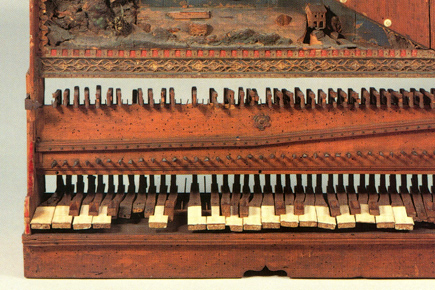Royal College of Music Hits the High Note!
Thursday 10 December 2015
The Heritage Lottery Fund (HLF) has announced support of £3.6m to redevelop the Royal College of Music Museum.
This significant investment will kick-start a three-year project to create a new Museum at the Royal College of Music, including new displays and a performance space for the RCM’s extensive and precious collection of historic instruments, including the world’s earliest surviving guitar and the oldest known stringed keyboard instrument, a clavicytherium (pictured).
Colin Lawson, Director of the RCM, said: “I am delighted that the Heritage Lottery Fund supports our redevelopment plans for the Royal College of Music Museum. Our rare collection of instruments is of great importance to our students and enhances learning in a multitude of ways. This HLF grant will allow us to progress the vital work needed to establish a new Museum at the very heart of the RCM and offer greater public access than ever before.”
The Royal College of Music Museum currently welcomes 8,000 visitors each year. This figure will rise to over 40,000 when the conservation and redevelopment programme is completed. Opening days will be increased from five days to six.
Sir Peter Luff, Chair of HLF, said: “The Royal College of Music is home to an extraordinary collection. These exciting proposals are just the thing to [provide a] brighter space with increased opening times and instrument handling opportunities. Music should be for everyone’s enjoyment and I think a round of applause is due to National Lottery players for helping open up this treasure trove for that very purpose.”
News of the HLF's financial support was covered by BBC Radio 4's Today programme on 10 December 2015, available on-demand here (from 1:07:50).
An extensive conservation project will be carried out on over 500 instruments, alongside documentation and digitisation of around 45,000 items that will be available online. Educational activities will include outreach sessions with schools, nurseries and adult care centres, temporary exhibitions and pop-up exhibitions to reach new audiences. The programme will also include training, volunteering and internship opportunities for conservation, digitisation and learning/engagement.
A selection of digital resources is already available, including an exciting partnership with the Google Cultural Institute.








